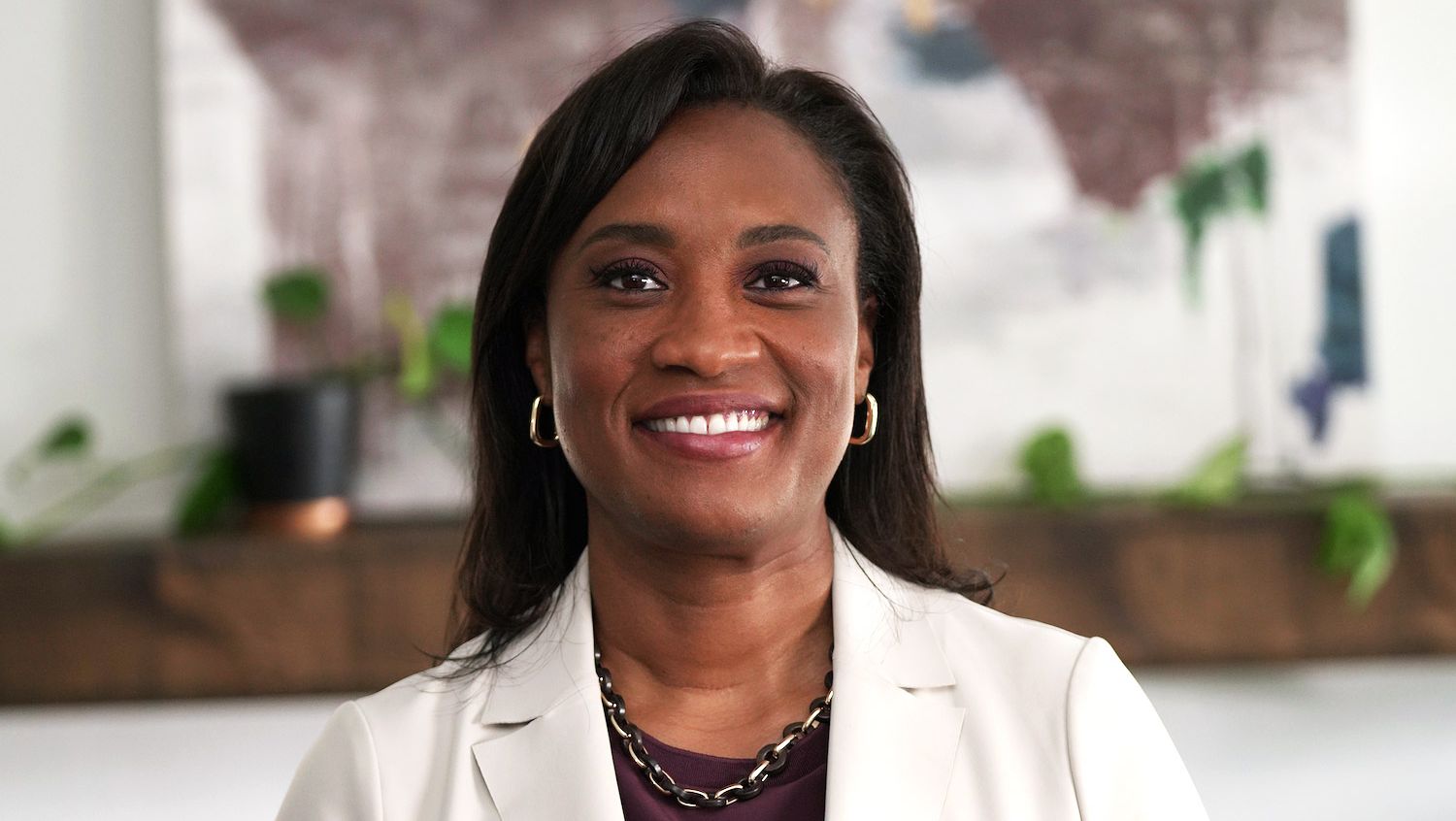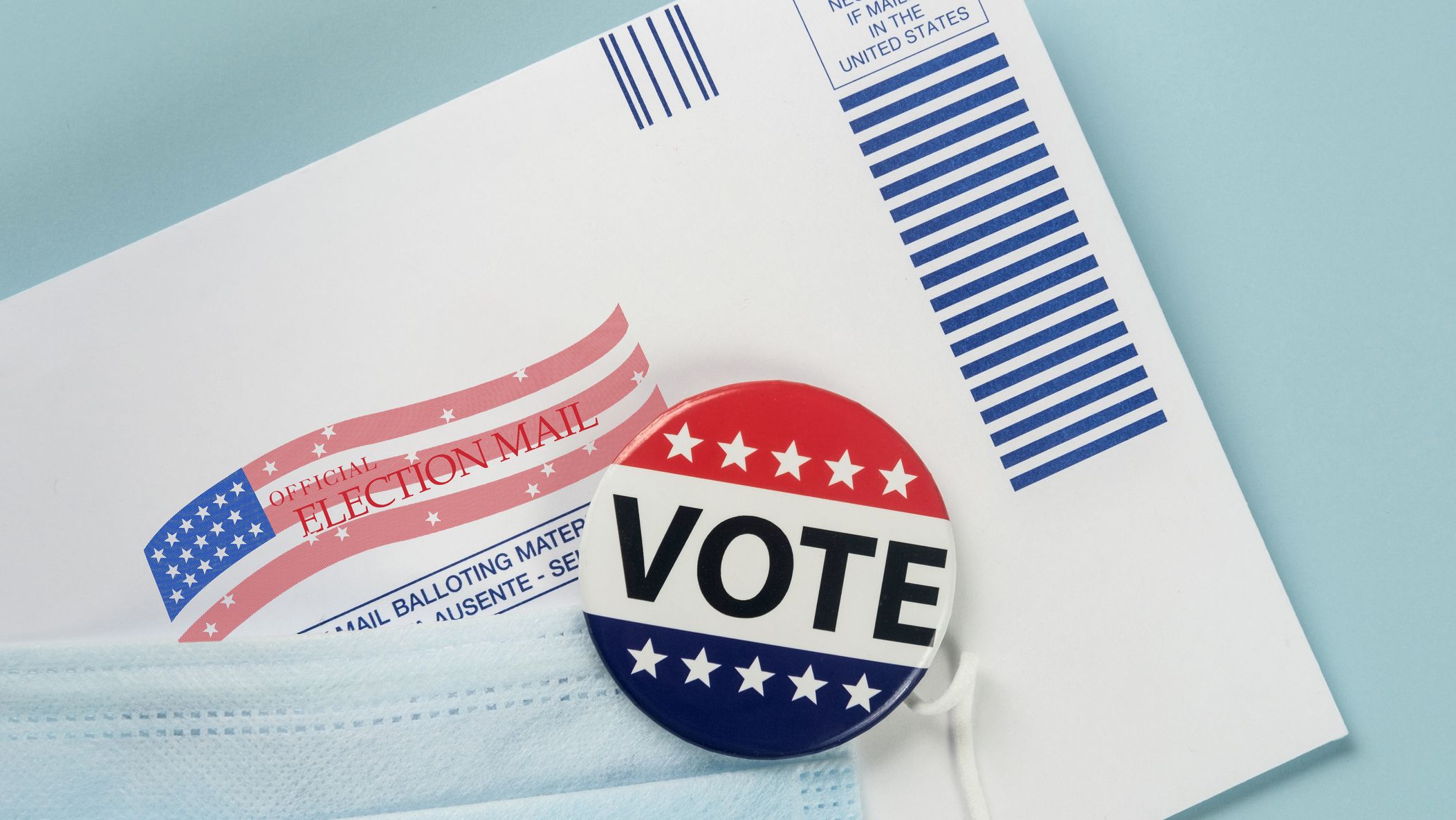EMILY's List President Laphonza Butler Has Big Plans for the Organization
Under Butler's leadership, the largest resource for women in politics aims to expand Black political power and become more accessible for candidates across the nation.


When Laphonza Butler was presented with the opportunity to become president of EMILY's List, she thought about her 7-year-old daughter, Nylah. What could Laphonza do every morning to help create a world that her daughter wants to be a part of? "I saw [the position] as a chance to help create that future where everyone can be fair and nobody is left behind," Butler, 42, tells Marie Claire. "EMILY's List works every day to make sure that Democratic pro-choice women are not left behind. To be able to be a part of that is what closed the deal for me—and having my daughter be excited about a new adventure."
On September 13, EMILY's List announced Butler would succeed Stephanie Schriock to become the organization's third president in its 36-year history and the first woman of color and mother to lead it. Since Ellen Malcolm founded the organization in 1985, EMILY's List's mission has evolved from solely fundraising for Democratic pro-choice women's campaigns to recruiting and training candidates at every level across the country and mobilizing voters. Over the years, it's become clear that victories require more than money; a holistic approach within the organization is critical, especially during a time when voting rights and abortion rights are under attack, to make sure candidates have the resources they need to win.
Butler knows she has her work cut out for her in holding and growing the Democratic majority as the 2022 midterm elections approach. Protecting the seats of Senator Catherine Cortez Masto of Nevada and Senator Maggie Hassan of New Hampshire immediately come to mind for her as top priorities, as well as putting candidate Cheri Beasley from North Carolina and current U.S. Representative Val Demings from Florida in the Senate. Butler intends to use her experience as a union leader, organizer, and political strategist to achieve this. As she prepares to usher the political powerhouse into its next phase, Butler spoke to MC about EMILY's List's plan to invest in combating misinformation and disinformation on the campaign trail, what leading the organization signifies to her during this pivotal time, and her vision for EMILY's List by November 2022.
Marie Claire: With the alarming number of attacks on abortion rights and voting rights across the country, will EMILY's List increase its focus on recruiting candidates at the state level?
Laphonza Butler: This is a year when we don't have the luxury of choice as it relates to where we focus—at the federal level or at the state and local level. To your point, we are seeing attacks and vulnerabilities in both sides of that. Electing Democratic pro-choice women in the executive offices at the state level is incredibly important to ensuring that we can protect and expand the rights of women and the general electorate all around.
You look at leaders like Governor Laura Kelly in Kansas. As the only Democratic governor elected in a state that President Trump won, she knows that her reelection is incredibly important to protecting the voting rights of Kansas residents. But also to make sure that women in Kansas continue to have access to abortion services if they need it and want it, so they are are able to make those decisions themselves without government involvement.
Whether it's Kansas in 2022 or Virginia in less than 40 days, we will have some real fights at the state level, making sure that we're recruiting, supporting, and electing Democratic pro-choice women like Hala Ayala to the lieutenant governor's office in Virginia, and making sure that we're protecting the Democratic pro-choice majority in the [Virginia] State House. It's not an either/or. This next midterms it's got to be a both/and, and EMILY's List is going to be in the fight.
Stay In The Know
Get exclusive access to fashion and beauty trends, hot-off-the-press celebrity news, and more.
MC: It appears the Democratic party is facing an identity crisis. The Senate is an obvious example with Joe Manchin and Kyrsten Sinema going against the party line when it comes to big agenda objectives like the infrastructure bill, but it also seems like the party as a whole is not aligning on critical issues, such as the message being sent at the border or packing the Supreme Court. How will EMILY’s List play a role in reshaping that identity through the leaders it helps recruit and elect?
LB: I don't think that the Democratic party is in an identity crisis. I think the Democratic party's full-throated debate is a continued expression of the big tent nature of the Democratic party, where all issues are considered and all voices are heard. Rejecting the premise of the question, I still believe that the mission of EMILY's List is very clear: That what we bring to the party is a continued focus on electing Democratic pro-choice women. A reflection of what happens when organizations like EMILY's List work together with the party is what happened last week when we finally had a Democratic pro-choice majority in the U.S. House to pass the Women's Health Protection Act. There is, of course, more work to do, but the Democratic party has always been a big tent and this is just another example of that.
I want to make sure that it's not just a Washington, D.C. organization, but that it's a Fayetteville, Arkansas, organization or a Pomona, California, organization.
MC: Are there specific strategies you have in mind to recruit more women, especially women of color, to run for office?
LB: Conceptually, what I believe is important for EMILY's List, in terms of recruiting more Democratic pro-choice women [to run for office], is really about: How do we make the organization relevant to all women in all communities and engage them where they are on the issues that are important to their constituents? EMILY's List is sort of considered to be—though I would take objection to it, but I know it's true—a very Washington, D.C. organization. I want to make sure that it's not just a Washington, D.C. organization, but that it's a Fayetteville, Arkansas, organization or a Pomona, California, organization. Making sure that we're supporting and electing and being very relevant in the lives of women who want to offer themselves as candidates for public service.
MC: You served as one of then-Senator Kamala Harris's senior advisors on the 2020 presidential campaign trail. What are some of the lessons you learned from your time working with her that you’re hoping to translate to your work at EMILY’s List?
LB: One of the things that I wasn't shocked about—but I admit I was disappointed by, and now am fully determined to have EMILY's List understand and be a resource for—is in the space of disinformation and misinformation. Senator Harris was then and continues to be one of the richest targets of disinformation and misinformation campaigns across the internet. I think that's true for a lot of women candidates, particularly women candidates of color. So understanding that phenomena and incorporating it into how we support candidates who are building their campaigns and making sure that their campaigns know how to effectively deal with these kinds of online attacks and smears is going to be really important to the next generation of women candidates to come.
MC: What made you want to get involved in politics?
LB: The foundation of my political socialization, like everyone, probably started at home, where my mom taught me nothing and everything about politics. Nothing in the sense that it wasn't like we were talking about elections or elected officials at our dinner table every night. But seeing her struggle as a working mom with three kids and a husband that had heart disease, often I had found myself asking, why? Then going to college at a historically Black university, [Jackson State University], and having the opportunity to learn from Civil Rights icons and activists in organizations like the Student Nonviolent Coordinating Committee (SNCC) and The Congress of Racial Equality (CORE) helped me put together both the experience of my family with the institutional structures that enable those kinds of conditions.
My work in the labor movement [leading the biggest union in California and the nation’s largest homecare workers union, SEIU Local 2015] really was about the next phase, if you will: What do you do to change it? Working with women and men and the union to build power together to create change for themselves and their families in the workplace really gave me the tools and experience to understand not just the struggles of everyday women and families and the tactics of the Civil Rights movement, but the elements to power building and how to really create change and sustain it over the longterm.
I'm fully aware of what it means for me, to other people and to other Black women across the country, to be in this role.
MC: You're the first woman of color and first mother to lead the organization. What does this moment signify to you?
LB: It's a moment of pride and a real moment of responsibility. As a kid from a small town in Mississippi that went to one of the nation's top historically Black colleges, I'm fully aware of what it means for me, to other people and to other Black women across the country, to be in this role. I know that the full story of EMILY's List's support for Black women candidates is one that hasn't yet been told. I want to be an instrument to help lead the full story of EMILY's List and its relationship to Black women, and to really throw the doors of EMILY's List open to all women. Making sure that no matter where a woman might [live] or what her language of origin might be, that she finds her political home at EMILY's List.
MC: Has EMILY's List begun the candidate recruitment process for the 2022 midterm elections?
LB: We're always in recruitment mode. We're always looking forward and working with candidates who we've supported in the past who are continuing to think about their public service. Or we're continuing to build relationships so that when an opportunity opens up, we can ask a particular recruit to put herself up for that office. The maps are just later this year than in previous years past when there's been a census. That's relevant not just for members of Congress, but for state legislatures as well. While we want to be proactive and engaging, frankly, in a state like Texas—to make sure that there are electoral consequences for people choosing to vote to limit women's rights to access abortion care services—we just don't know where the districts are going to be. We need to make sure that we have candidates that match the districts once the maps get finalized.
MC: By November 2022, what's your vision for EMILY's List?
LB: EMILY's List will continue to be a premier political organization for all women at every level of government, making sure that we are communicating to America's daughters that they belong at decision-making tables, wherever they choose to be. We will have examined our brand and made sure that we are relevant to communities of women all over the country. We will have built the collective infrastructure to build power for women (that goes for anything from data to messaging). We will have built the partnerships that make us an incredibly relevant organization. And, of course, we will have continued to raise hundreds of millions of dollars to support Democratic pro-choice women candidates all over the country at every level of government.
Interview has been lightly edited for length and clarity.
Related Stories


Rachel Epstein is a writer, editor, and content strategist based in New York City. Most recently, she was the Managing Editor at Coveteur, where she oversaw the site’s day-to-day editorial operations. Previously, she was an editor at Marie Claire, where she wrote and edited culture, politics, and lifestyle stories ranging from op-eds to profiles to ambitious packages. She also launched and managed the site’s virtual book club, #ReadWithMC. Offline, she’s likely watching a Heat game or finding a new coffee shop.
-
 Kendall Jenner's Packing Viral Color Trends for Coachella This Year
Kendall Jenner's Packing Viral Color Trends for Coachella This YearThis spring shade is officially It-girl approved.
By Lauren Tappan Published
-
 Kendall, Kaia, and Gigi’s Under‑$150 Sneakers
Kendall, Kaia, and Gigi’s Under‑$150 SneakersShe's not alone.
By Julia Marzovilla Published
-
 Act Fast—Diptyque’s Cult-Favorite City Candles Are Finally Available Online But for 10 Days Only
Act Fast—Diptyque’s Cult-Favorite City Candles Are Finally Available Online But for 10 Days OnlySatisfy your wanderlust, minus the jet lag.
By Brooke Knappenberger Published
-
 36 Ways Women Still Aren't Equal to Men
36 Ways Women Still Aren't Equal to MenFeatures It's just one of the many ways women still aren't equal to men.
By Brooke Knappenberger Last updated
-
 How New York's First Female Governor Plans to Fight for Women If Reelected
How New York's First Female Governor Plans to Fight for Women If ReelectedKathy Hochul twice came to power because men resigned amid sexual harassment scandals. Here, how she's leading differently.
By Emily Tisch Sussman Last updated
-
 Why the 2022 Midterm Elections Are So Critical
Why the 2022 Midterm Elections Are So CriticalAs we blaze through a highly charged midterm election season, Swing Left Executive Director Yasmin Radjy highlights rising stars who are fighting for women’s rights.
By Tanya Benedicto Klich Published
-
 Tammy Duckworth: 'I’m Mad as Hell' About the Lack of Federal Action on Gun Safety
Tammy Duckworth: 'I’m Mad as Hell' About the Lack of Federal Action on Gun SafetyThe Illinois Senator won't let the memory of the Highland Park shooting just fade away.
By Sen. Tammy Duckworth Published
-
 Roe Is Gone. We Have to Keep Fighting.
Roe Is Gone. We Have to Keep Fighting.How To Democracy always offers a path forward even when we feel thrust into the past.
By Beth Silvers and Sarah Stewart Holland, hosts of Pantsuit Politics Podcast Published
-
 The Supreme Court's Mississippi Abortion Rights Case: What to Know
The Supreme Court's Mississippi Abortion Rights Case: What to KnowThe case could threaten Roe v. Wade.
By Megan DiTrolio Published
-
 Sex Trafficking Victims Are Being Punished. A New Law Could Change That.
Sex Trafficking Victims Are Being Punished. A New Law Could Change That.Victims of sexual abuse are quietly criminalized. Sara's Law protects kids that fight back.
By Dr. Devin J. Buckley and Erin Regan Published
-
 My Family and I Live in Navajo Nation. We Don't Have Access to Clean Running Water
My Family and I Live in Navajo Nation. We Don't Have Access to Clean Running Water"They say that the United States is one of the wealthiest countries in the world. Why are citizens still living with no access to clean water?"
By Amanda L. As Told To Rachel Epstein Published